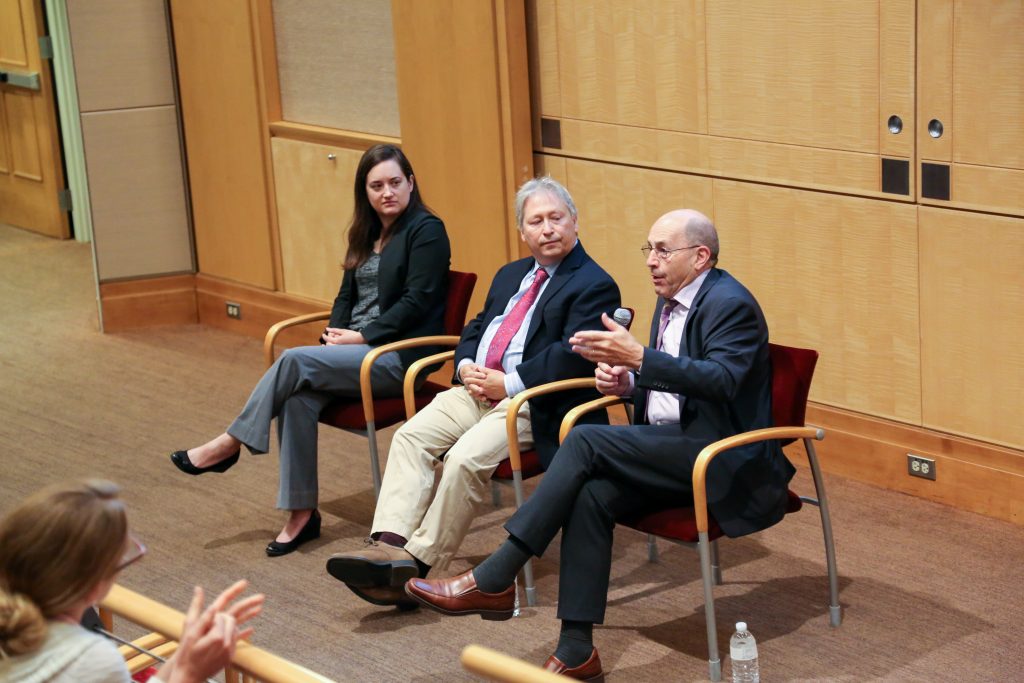Forum Highlights Connections Between Climate Change and Health

From left: Renee Salas, Peter Wayne and Bill Ravanesi
Is global warming making us sick? On July 2, experts featured at the Osher Center Integrative Medicine Grand Rounds discussed how climate change is affecting health and explored how patients, clinicians and the health care industry can address these issues.
Worldwide, climate change is leading to more extreme weather events, such as heat waves; air pollution that results in about 7 million deaths per year; water contamination; and lower nutritional content in some crops, said Renee Salas, MD, MPH, MS, of Massachusetts General Hospital and the Harvard Global Health Institute.
Clinicians are already seeing some of the consequences firsthand among their patients, she added. For example, allergy sufferers are increasingly bearing the burden of global warming, as rising temperatures cause plants to produce pollen earlier in the year and in greater quantities. Meanwhile, more destructive weather events, such as intense hurricanes, have disrupted health care supply chains and patients’ ability to access care.
Health care providers have a responsibility to play a central role in addressing these concerns, Salas said, pointing to a recent study showing that Americans consider primary care physicians their most trusted source for information around climate change and health.
“Primary care physicians need to unify and educate the community around environmental issues,” said Salas.
Peter Wayne, PhD, research director of the Osher Center for Integrative Medicine, explained how lifestyle and integrative practices like healthy eating, exercise, mindfulness meditation and tai chi can help improve the health of both individuals and the planet.
Wayne highlighted some direct links between lifestyle choices and environmental impact. He referenced research on the Mediterranean diet — which emphasizes plant-based foods, fish and poultry and minimizes red meat — that suggests it may be more environmentally sustainable while also benefiting cardiovascular health. He also described how substituting short car trips with bike rides lessens carbon emissions while improving an individual’s health and fitness.
“Mindfulness meditation may make us kinder people and more considerate of others. Altruism for one another might carry over into care for the environment and for other species,” said Wayne, citing studies supporting these findings.
Bill Ravanesi, MA, MPH, senior director of the Green Building & Energy Program at Health Care Without Harm — which partners with health care organizations worldwide to reduce their environmental footprint — underscored the role that health care systems can play in mitigating climate issues through actions as simple as serving more meatless meals.
“If the U.S. health care system were a country, we would be the 13th largest in the world for greenhouse gas emissions,” said Ravanesi. “The footprint of health care is colossal. We have a moral obligation to get ahold of this and move forward.”
Partners HealthCare and its institutions are already at the forefront of decarbonization and energy efficiency, he added, pointing to the system’s proactive approach to developing resilience studies and upgrading its facilities to combat rising sea levels and other climate-related concerns.
Wayne reaffirmed how small steps can play a key role in facing the global threat of climate change. “We need to think globally and act extremely locally — that is, prevention and self-care,” he said. “This is my prescription for both integrative medicine providers and patients.”
View a video recording of the presentations.

Leave a Reply